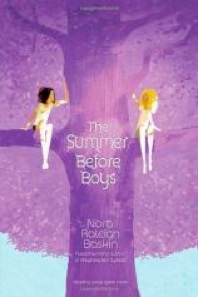The Summer Before Boys
The Summer Before Boys
a novel by Nora Raleigh Baskin

kirkus (starred review)
An extraordinary novel explores the challenges faced by children whose parents have gone off to war. When her mother’s National Guard unit is deployed to Iraq, Julia spends her summer with her best friend and cousin, Eliza. The grounds of the century-old mountain lodge where Eliza’s dad works is the perfect setting for Julia and Eliza’s favorite childhood game, in which the girls pretend to be young ladies from the past. For years, their vivid imaginations transported them to another time. Now, though, while Eliza eagerly reenters this imaginary landscape, Julia discovers her mother’s deployment keeps her firmly anchored in reality. The arrival of Michael, a child of another lodge employee, further strains the girls’ relationship. Julia must decide where her loyalty lies: partnering Eliza in their imaginary world or with Michael. Interspersed throughout the narrative are Julia’s accounts of American women who have died in wars throughout history. These poignant commentaries serve to illuminate Julia’s anguish and uncertainty about her mother’s safety. Baskin adeptly portrays Julia’s ambivalence and anxiety in this thoughtful tale that artfully brings the war to the homefront.
Booklist
…Baskin perfectly captures friendship among girls on the edge of puberty, especially the way big dramas work out in small moments. Julia is haunted by current reports of deaths in Iraq, as well as historical stories of women in war, from Gettysburg to World War II and Vietnam. At the same time, everything is changing with Eliza. Is Michael worth it? A poignant story of children on the homefront and the ways that a first love can break up longtime friendships and change things forever.
— Hazel Rochman
Publishers Weekly
The intimate tone and absent-mother theme found in several of Baskin’s previous books (What Every Girl [Except Me] Knows; All We Know of Love) echo in this coming-of-age novel about the growing pains endured by Julia, the daughter of an American soldier. With her mother stationed in Iraq and her father working, Julia spends the summer with her “cousin” Eliza (“who is really my niece, but since we are both twelve years old that feels kind of stupid”). Growing up together, the two girls have always been best friends, but this summer Julia feels distanced from Eliza, not just because Eliza has a mother who is at home, but also because Julia suddenly finds herself more focused on boys than on the games of make-believe she and Eliza play at the hotel where Eliza’s father works. When Julia develops a crush on the son of a hotel employee, the girls’ friendship becomes even more strained. Baskin’s wistful narrative carefully evokes the changes in Julia’s life and attitude: Julia’s uneasiness about new romantic feelings and her anxiety about her mother’s safety ring true. Ages 9–12. (May)
THE HORN BOOK
Best friends Julia and Eliza are also aunt and niece. Almost thirteen, they are straddling that time between childhood and adolescence. When Julia’s mother is sent to serve in Iraq, Julia stays with Eliza and her family. Eliza’s father, Uncle Bruce, works at a historic resort that has for years allowed the girls the perfect backdrop for their imaginative play. As they walk around the grounds, they imagine themselves in long dresses and broad-brimmed hats, affecting the speech and mannerisms of the mid-1800s. They make a promise to each other: “We will be friends forever. Never will any boy come between us. You will turn down every suitor until your mother and father give up.” But the tight bond the girls have always shared is beginning to come undone. The war that has taken Julia’s mother away is one change. Julie keeps a careful count of women who have died in American wars, from the Civil War to the present, and her underlying worry is clear: her mother could be one of these women. Julia is also developing a crush on a boy who works at the resort and tries to hide her feelings from Eliza. The story takes a dramatic turn that will be familiar to anyone who knows thirteen-year-olds. Baskin covers this emotional territory with respect and honesty, allowing readers to see themselves in these complicated, yet likable, girls.
— Robin L. Smith
